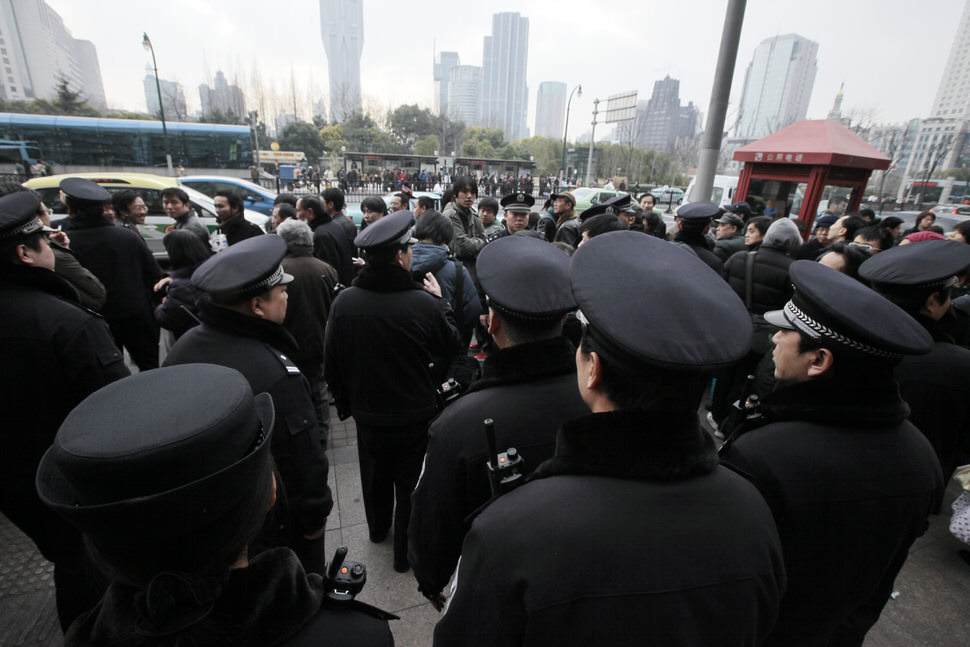In an NYRblog post on February 17 (“Middle East Revolutions: The View from China”), I discussed Chinese government efforts to block news of the democracy uprisings spreading across the Middle East and speculated how China’s rulers might view those uprisings. I have now received news that resolves much of that speculation and that may also help explain the unusual show of force by Chinese security officials this weekend in response to a call for street protests to support a “Jasmine Revolution” in several Chinese cities.
On Saturday, February 12, the day after Hosni Mubarak resigned in Egypt, some of the members of the politburo of the Communist Party of China held a special meeting in Beijing to discuss the events in the Middle East. News of this meeting came via a democracy activist in Beijing, who said that a secretary who was present had leaked a summary of its contents. The democracy activist is a person who is well positioned to judge the authenticity of such a report.
On February 18, the summary of the Politburo meeting was also posted publicly on Boxun (“rich information”), an independent Chinese language news web site. It reads:
The agenda for the meeting was “to adjust foreign policy” and the main purpose was to decide on tactics to counter the current wave of democratization in the Middle East. The meeting set revised targets for the police and the military, but the primary emphasis was on propaganda. The meeting called upon the Propaganda Department and its subsidiary organs to do the following:
—Halt all independent reports, commentaries, and discussions (including Internet threads), whether in the print media or the Internet, on the situations in Egypt and similar places;
—Strengthen work in filtering and managing blogs, microblogs, and discussion forums;
—Assure that media in all locations uniformly adhere to the standard texts of the New China News Agency in any report or commentary on the Middle East.The meeting decided, as well, that all of the major newspapers under the Propaganda Department must strengthen their guidance of public opinion and stress the theme that the current turmoil “is plotted by the United States behind the scenes.” At the same time, efforts to criticize and control microblogs must be sharply increased, and advance measures should be taken to prepare for the possibility that part of the Internet will be shut down.
Following the meeting, propaganda chiefs across the country were given an additional instruction to “reduce reporting on any sensitive incident that might occur in your locale.”
In China the words of the Politburo have quick effects. Already there has been increased deletion of web messages and closing of websites that mention the Middle East, as well as accelerated “guidance” of public opinion in the state-run press. Take the Global Times, for example, a newspaper that appears modern and international and that clearly aims to appeal to youth but is also careful to “guide” political opinion as the Communist Party wants. On February 18, six days after the Politburo meeting, the paper ran an opinion piece on its editorial page titled “Microblogs Are Not Necessarily Such Great Things.”
Meanwhile, the government’s robust response to an anonymous call for a “Jasmine Revolution” in China, posted on the Internet, shows just how seriously it fears pro-democracy activism might be spread online. The appeal to start a “Jasmine Revolution” was also first posted on Boxun, a day before the leak about the Politburo meeting, and it spread quickly by Twitter, microblogs, and other social media. Though it is unclear who wrote the post, it drew a strong response both from democracy advocates, who called for protests in thirteen major cities, and from the police, who began an immediate security clamp down. Within a matter of hours of the posting, dozens of democracy advocates in several cities, including signers of Charter 08 and prominent rights lawyers, were detained, interrogated, or brought to police stations for what has come to be known as “forcible invitations to tea.”
On February 19, the Boxun site was shut down, though its administrators have been since been able to reopen on a different “temporary” site and been trying to carry on. The use of the word “Jasmine” on the Internet was blocked and there were also restrictions placed on sending cell phone text messages to multiple recipients, according to news reports. Nevertheless, protesters did gather in both Beijing and Shanghai on Sunday, February 20, but were immediately dispersed by large numbers of police.
On the morning of February 19, President Hu Jintao went to the Central Party School to deliver a speech to an audience of provincial governors and central government ministers on maintaining social stability. The speech stressed the glorious achievements of the Communist Party, emphasized the correctness of Party ideology, and in other ways bristled with unenlightening jargon. Its purpose seems to have been to present a public version of the policies decided at the secret Politburo meeting of a week earlier. Without directly mentioning the Middle East or any of the events in China that were making authorities so nervous, Hu made three basic points: one, we need to greatly strengthen control of information on the Internet; two, we need to regulate the “virtual society” that it has given rise to; and three, we need to guide public opinion in this society in “healthy directions.”
Advertisement
To date there is still little evidence that the “masses” of the Chinese people are ready to involve themselves in democracy protests. But the evidence is strong and growing that the top leaders have become extremely nervous about the current situation, as they watch people rising up in country after country in North Africa and the Middle East, assisted by social media and the Internet. No doubt China’s leaders fear what would happen if jasmine ferment really did spread to their own masses—many of whom already harbor a lengthy list of grievances over corruption, bullying, land seizures, environmental destruction, and other items of unjust treatment.



